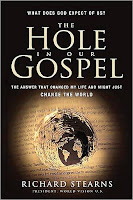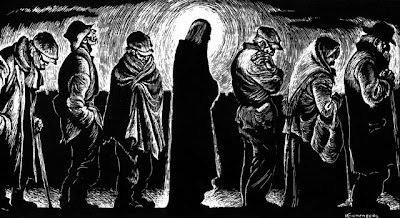 Recently, I was sent a copy of “The Hole In Our Gospel” (Thomas Nelson, hardcover, 320 pages, $22.99) to read and review. Written by the U.S. President of World Vision, Richard Stearns, the book journeys into the great problems of the world and analyzes how Christians, specifically in America, relate to them.
Recently, I was sent a copy of “The Hole In Our Gospel” (Thomas Nelson, hardcover, 320 pages, $22.99) to read and review. Written by the U.S. President of World Vision, Richard Stearns, the book journeys into the great problems of the world and analyzes how Christians, specifically in America, relate to them.
Seeing that the book was written by the head of an international aid organization, I must admit that I began with feelings of skepticism and reluctance. I expected a simple, shallow, and guilt-ridden message that would end with a plea for World Vision support. However, this book steers far from that path. Surprisingly, Stearns never directly advocates for the support of a World Vision child. Instead, he walks alongside the reader through many challenging issues, pointing out what he sees along the way. I can imagine no better tour guide than the man who not only leads one of the largest humanitarian organizations in the history of the world, but also one who has set foot in nearly 100 of the poorest countries in the world. Stearns doesn’t just lightly suggest the pursuit of justice and care for the poor—he is battling on the frontlines himself.
From the outset of the book, I was comforted with the relative normalcy of Richard’s early life. In addition to feelings of apathy and ignorance towards suffering in our American churches, for most of his life he was also consumed with materialism and the addiction of corporate success. Proclaiming that he is no ‘Mother Teresa’, he sincerely aims to show that he should not be lifted up as an other-worldly wonder-worker. He makes a point that he is an every-man, and it shows through his experiences. This encouragement yields a hope that anyone, no matter where they are in life, can experience a true conversion of the heart.
The book opens by detailing his early life as an incredibly successful young business man, jumping from role to role as a leader of multiple companies. The early parts of the book chronicle his personal journey of enlightenment, one that led him to realize this great ‘hole’ that we American Christians have in our version of the Gospel and our call to fill it. Using many sources and texts from the Bible, he walks the reader through the blatant evidence in Scripture that point to this ‘hole’, namely that God is determinedly on the side of the poor.
Stearns sprinkles the book with quotes from many throughout history–from the great thinkers of the past such as St. Teresa of Avila and St. Augustine, to modern world-changers like Mother Teresa, Gandhi, and Martin Luther King, Jr., and even from great modern thinkers like Robert Frost, C.S. Lewis, Dallas Willard, Albert Einstein, and Bono. Stearns sees one uniting string that stretches throughout all of history, one that also weaves throughout our modern life. This string interlaces brilliance and charity, contemplation and action, enlightenment and love, and in fact began with God. He displays a deep harmony between those who understood life at its core and those who cared most for the greatest injustices of their day. As an example Stearns, like me, considers Bono to be one of today’s greatest prophets, despite being a pariah amongst many of today’s churches. Religious inconsistencies arise when those who care most for the pain in the world don’t ‘fit’ in our churches.
Stearns sees one common message that has been proclaimed through different words by different people at different times: God cares for the poor and the downtrodden immensely, and a person claiming to love God should be living a life that reciprocates that care. And he suggests that we in American are coming up way short.
The seriousness of poverty in this world quickly becomes evident, and the lack of response from the American church becomes clear just as fast. Stearns notes that despite the Old Testament mandate to tithe, or give 10%, of one’s income to the church and the poor, American Christians on average give away only 2% of their income to churches or charities. And only 2% of this 2% goes to fund international work—0.04% of American Christian’s total income. Understanding that, these statistics become terribly convicting:
• The total annual income of American churchgoers: $5.2 trillion
• Amount available if each of them gave 10% of their salary: $520 billion
• Estimated annual cost to eliminate extreme poverty in the world: $65 billion
• Annual cost for universal primary education for ALL children in the world: $6 billion
• Annual cost to bring clean water to most of the world: $9 billion
• Annual cost to bring basic health and nutrition for the world: $13 billion
• Total to eradicate the world’s greatest problems: $93 billion (1.8% of American Christian’s income)
We just agreed to push through an $800 billion financial bailout in our country. Stearns opens our eyes to the fact that Americans have the potential and the resources to bring billions and billions of people out of extreme poverty at a relatively small cost. American Christians by themselves—even excluding the rest of America and the world!—have enough available resources to end the great problems of this world. So why isn’t this happening? That question is left to stir in the minds of readers throughout the book.
Towards the end of the book, Stearns finishes by igniting a passionate vision in the minds of readers. He asks the reader to imagine, “how stunning it would be to the watching world for American Christians to give so generously that they:
• Brought an end to world hunger
• Solved the clean water crisis
• Provided universal access to drugs and care for the millions suffering from AIDS, malaria, and tuberculosis
• Virtually eliminated the more than 26,000 daily child deaths (20,000 of which are estimated to stem from hunger issues)
• Guaranteed education for all the world’s children
• Provided a safety net for the world’s tens of millions of orphans”
If this happened, “the global social revolution brought forth by the body of Christ would be on the lips of every citizen in the world and in the pages of every newspaper—in a good way”. How would the world see Christians—and especially the One they follow—if we in America put our money where are prayers and Bible claim we stand? What adjectives would the world then use to describe Christians instead of judgmental, hypocritical, and selfish?

This book is not one that leaves the reader filled with guilt and inadequacy. Instead, it inspires hope and the feeling that one can actually make a difference. It ends with practical steps one can take to begin joining the fight for the oppressed, but as a whole the book’s foremost goal is to transform the reader’s heart into one that breaks for the broken.
I really can’t recommend this book enough to those who sincerely want to follow Jesus. Richard Stearns delicately, yet directly, calls the church in America to action against all injustices in the world. He recognizes that as people who claim to follow Jesus, “our heart must break for the things that break God’s heart.”
Be very careful if you decide to read this stellar book; like any encounter with needed truth, you will feel increasingly uncomfortable as you flip through the pages. However, once you catch the vision Stearns paints, you will be invigorated to slam the book shut and begin to change your small pieces of the world. We all have the opportunity to make an impact, in this country and even in others. As many throughout history have echoed, now is the time to stand up and break the chains of injustice in our world. Let’s go.
